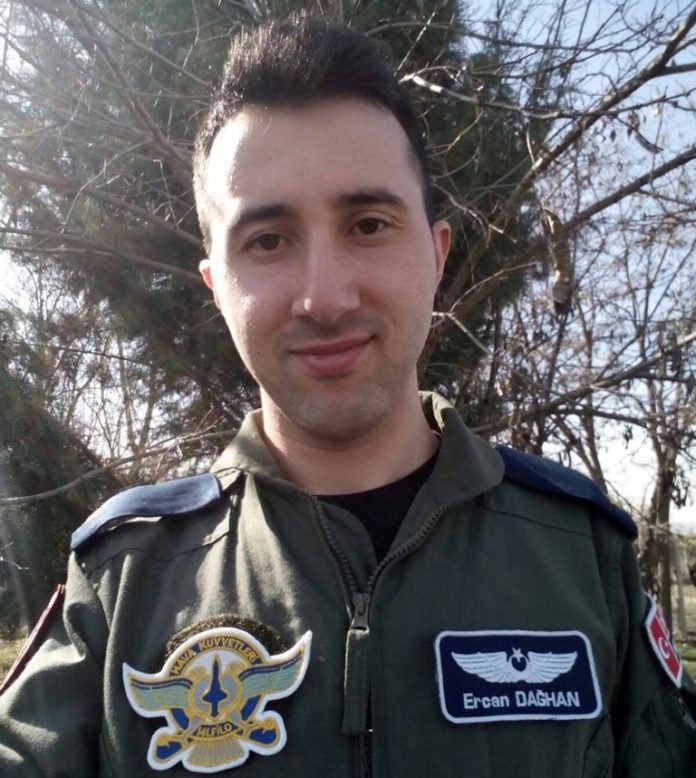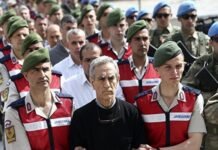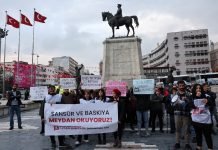Ercan Dağhan, a former 2nd lieutenant who has been in pre-trial detention for more than four years on charges of coup-plotting, is fighting cancer in handcuffs, Bold Medya reported.
Dağhan was diagnosed with lymphoma in prison and is currently undergoing treatment in an Ankara hospital. But according to his family, he is handcuffed to his bed, and three gendarmes stand guard in his room at all times, making it impossible for Dağhan to be treated in a sterile environment. According to doctors, sanitary conditions are very important in his case because his immune system is compromised. He was also refused the right to have a family member serve as his hospital companion despite a doctor’s permission.
Dağhan has suffered other health problems as well during his time in prison. He got food poisoning and later also contracted COVID-19.
Dağhan was arrested after a controversial military coup attempt on July 15, 2016 that according to many was a false flag aimed at entrenching the authoritarian rule of President Recep Tayyip Erdoğan by rooting out dissidents and eliminating powerful actors such as the military in his desire for absolute power.
Dağhan was in training at Akıncı Airbase, which was the command center for the failed coup according to the Turkish government. He said in court his wing commander gathered them late in the afternoon of July 15 and said there would be a large counterterrorism operation that night. But according to his testimony, he did not take part in any operations. He was arrested in the morning after the abortive putsch as he was about to leave the airbase and faces aggravated life imprisonment on coup charges.
On July 15 then-Chief of General Staff Gen. Hulusi Akar was allegedly held at Akıncı Airbase after being taken hostage by coup plotters. Everyone at the airbase that night was accused of taking part in the coup.
According to the testimony of several soldiers, including commander of Akıncı Airbase Brig. Gen. Hakan Evrim and former Air Forces Commander Gen. Akın Öztürk, Akar was not a hostage at Akıncı Airbase and went there of his own volition on the night of the coup.
The coup attempt killed 251 people and wounded more than a thousand others. The next morning, after announcing that the coup had been suppressed, the Turkish government immediately launched a huge purge of military officers, judges, police officers, teachers and other government officials, which ultimately led to the summary dismissal of more than 150,000 public servants from their jobs.
According to a spokesperson for the Turkish Ministry of Defense, a total of 20,312 military personnel have been summarily dismissed from the Turkish Armed Forces (TSK) since the abortive putsch and investigations are ongoing into a further 3,718 military personnel.
Ömer Faruk Gergerlioğlu, a prominent human rights activist and a deputy from the pro-Kurdish Peoples’ Democratic Party (HDP), said Dağhan’s continued imprisonment was a legal atrocity. “A cancer patient is being kept in prison although there is no conviction,” he said.
Gergerlioğlu had previously depicted the deaths of critically ill prisoners in Turkey who are not released in time to receive proper medical treatment as acts of “murder” committed by the state.
The violation of prison inmates’ basic rights in Turkey is one of the topics raised frequently by activists and human rights defenders. In August journalist Mevlüt Öztaş and TV director Fatih Terzioğlu succumbed to cancer, which they developed in prison and for which they could not get proper treatment. Both were refused the postponement of their sentences they were entitled to and were belatedly released despite medical reports attesting to the fact that they were unfit to remain in prison.
According to the Human Rights Association (İHD), there are about 1,605 sick prisoners in Turkish prisons, 604 of whom are critically ill. These numbers are rapidly increasing as the COVID-19 pandemic has been hitting overcrowded prisons the hardest.
Amnesty International and 26 other rights groups and civil society organizations from Turkey and around the world released a joint statement in March calling for the release of Turkey’s political prisoners, particularly those with a high risk of complications due to COVID-19, caused by the novel coronavirus.
Although most of the seriously ill patients have forensic and medical reports deeming them unfit to remain in prison, they are not released. Authorities refuse to free them on the grounds that they pose a potential danger to society. In the first eight months of 2020, five critically ill prisoners passed away because they were not released in time to receive proper medical treatment.














